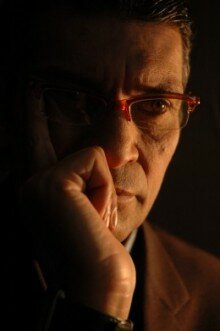
Although he studied Philosophy, Linero says that being born on the day the first artificial satellite, Sputnik, was launched, he could not escape being a musician and a poet. The titles of three of his books point to his love of music — son, bolero, jazz— and he has written and produced several music CDs. Philosophy is a constant influence in his poetry, in which he aspires to exalt humanist values.
Ever since his first book, Sonata of the somnabulist, Linero has worked on something that contemporary poetry disdains nowadays: its intimate connection with music. In the first book — postmodern and urban — music is an insistent presence expressed through the rhythm of the poems. But in the rest of his work the musical element resides more in the intonation and emotional content.
Critics have defined him as a pure lyric poet. His perceptions — of lost landscapes finely described — and his thoughts — his observation of a world full of contradictions — always have a musical aura, not of flutes and drums, but — although he studied orchestral conducting and is a professional pianist — of what corresponds to the basic musical component of poetry: lyricism.
However, the main theme of Linero’s poetry is not music, but his reflections on writing poetry and on daily life; his imagination, his metaphors, which move between the work of a poet and music and musical instruments, seek only to describe with precision what writing poetry and simply living are for him:
Lesson 4
There are days that show the reverse of the note,
not apt for the light of songs. However, problematic
— like a bassoon in the family — they force one to
sing so that things will endure. It is then necessary
to stammer, to evoke the lasting kiss defending us
from emptiness.
As he evolved from the rhythm of his first book to the tone of his subsequent volumes, he also exchanged the cold urban atmosphere for a more everyday and family ambience. It is as if his poetry was searching for quietness and harmony: he writes about his family, his friends or even his mascot.
Emotive and limpid, his poems create an atmosphere of sonorous sublimation. There are no dramatic passages in his poems, although they reveal fundamentally the tribulations inherent in living, because like poets such as Montale or Quasimodo, Fernando Linero has the characteristic of using balmy words and phrases that make reality less tragic — “I truly/ know nothing about this world/ but it is here where I have/ my hidden treasure”— and that makes his anxiety less transcendent: “I know that all is no more than an accident”.
Bibliography
Poetry
Sonata del Sonámbulo, Pijao Editores, Biblioteca de Autores Colombianos, N° 1, Bogotá, 1980
La risa del saxo, Cuadernos de Poesía Ulrika, Bogotá, 1985
Guijarros, Fundación Simón y Lola Guberek, Bogotá, 1990
Aparte de amor, Escritores de un Nuevo Siglo, Centro Colombo Americano, Bogotá, 1993
Palabras para el hombre, Editorial Magisterio, Bogotá, 1990
Lecciones de fagot, Universidad Nacional de Colombia, Bogotá, 2004
El bolero en sus propias palabras, Editorial Icono, Bogotá, 2008
Links
In Spanish
Virtual Library Luis Ángel Arango
http://www.lablaa.org/blaavirtual/publicacionesbanrep/boletin/boletin67/bol32a.htm
/>Review of Lecciones de fagot
International Poetry Festival of Medellin page
http://www.festivaldepoesiademedellin.org/pub.php/es/Revista/ultimas_ediciones/64/linero.html
/>Poems and short biography







